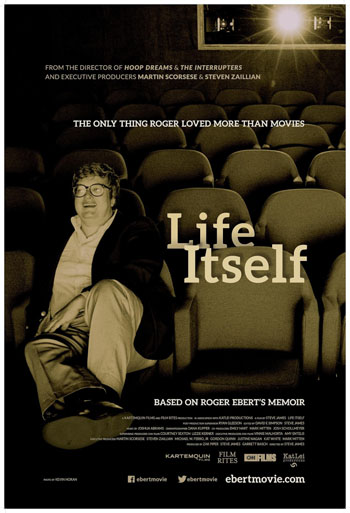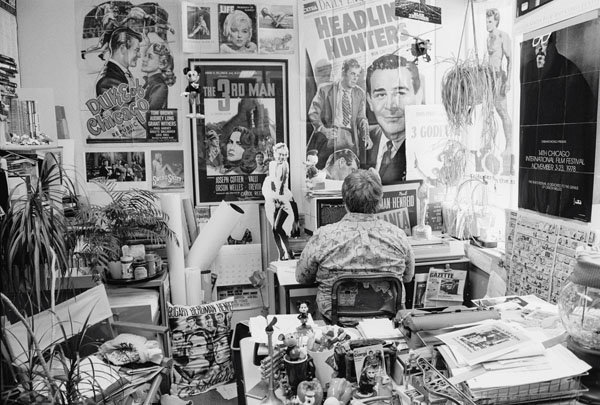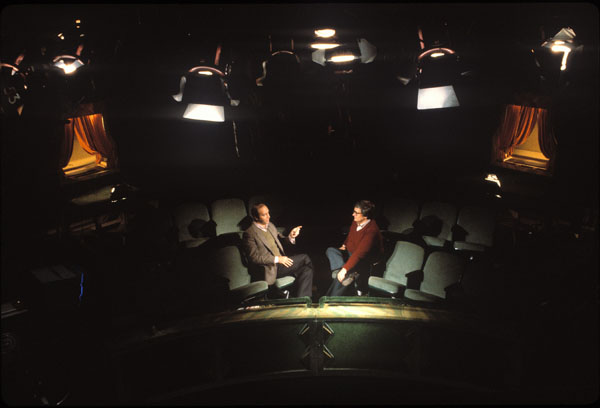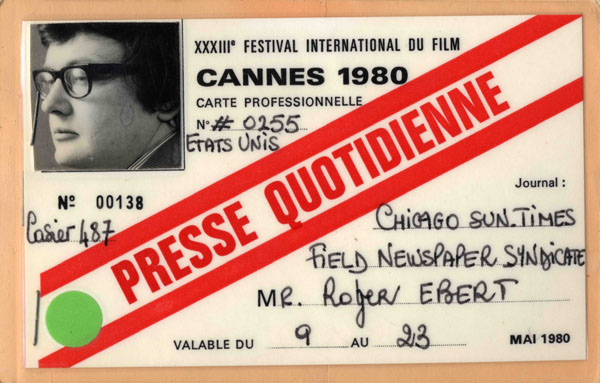“At the beginning of Life Itself, which premiered at Sundance on Sunday night, Roger Ebert gives his description of movies as a ‘machine that generates empathy.’ Based on the audible sobs from the audience as Steve James’s documentary, and Ebert’s life, neared their ends, this machine did its job exceptionally well.” Criticwire‘s Sam Adams reports on the Q&A that followed and “served as a miniature panel discussion on Ebert’s life and work, with James joined by Ebert’s widow, Chaz, Marlene Siskel, the widow of Ebert’s longtime TV companion, and Ebert’s friend William Nack.”
Steve James (Hoop Dreams) delivers a “meticulous and intensely emotional portrait,” writes Variety‘s Scott Foundas. “Given unfettered access to Ebert during what turned out to be the last four months of the venerated critic’s life, James cuts—as in all of his best work—straight to the human heart of the matter, celebrating both the writer and the man, the one inseparable from the other, largely in Ebert’s own words…. Unsurprisingly, much of Life Itself is given over to Ebert’s democratizing and popularizing impact on the world of film criticism, with judiciously chosen clips (Bonnie and Clyde, Cries and Whispers, Raging Bull) and excerpts from those same films’ respective reviews used to show how Ebert combined his encyclopedic knowledge of cinema with an accessible, plainspoken writing style that could be understood by anybody. Filmmakers including Errol Morris, Werner Herzog and Martin Scorsese (also an executive producer here) speak to the specific contributions Ebert made to their careers, Scorsese tearing up as he remembers a tribute Ebert and his TV sparring partner Gene Siskel organized for him in Toronto at one of the lowest moments of his personal and professional life.”
“If you had asked me ahead of time what I would have found most interesting about Life Itself, I would have guessed that it would be the parts I knew least about, specifically Roger’s harum-scarum days as a young film critic about town in high-spirited Chicago,” writes the Los Angeles Times‘ Kenneth Turan. “Paradoxically, the opposite was true.” He focuses specifically on “the sections that enlarged my understanding of Roger’s relationship with his remarkable wife, Chaz, particularly as their vibrant marriage took on the cataclysmic series of illnesses that marked the final decade of Roger’s life. The cascading surgeries that Roger went through would have toppled a less indomitable man, and it was difficult for me to watch the scenes that show Roger in obvious discomfort and pain. But having a behind-the-scenes look at the truth of Roger’s remark that Chaz’s love was ‘like a wind pushing me back from the grave’ genuinely brought tears to my eyes.”
Two months ago, James released this video for the film’s Indiegogo campaign
For Joe Leydon, “Life Itself very often recalls L.P. Hartley’s oft-quoted line—’The past is a foreign country: they do things differently there’—as it harkens back to a time when film critics like Roger Ebert, Gene Siskel, Pauline Kael and Andrew Sarris were influential figures in popular culture, when critics actually could play vital roles in helping launch and sustain the careers of great filmmakers.” Scorsese “is deeply affecting as he speaks in Life Itself about Roger’s early review of his debut feature, Who’s That Knocking at My Door? His heartfelt words make you appreciate Roger Ebert all the more—but also make you wonder who, if anyone, has the credibility and influence today to launch the next generation of filmmakers.”
Back in Variety, Ramin Setoodeh picks out “five of the film’s most surprising moments.” Matt Zoller Seitz has a good long conversation with James at RogerEbert.com. And James is Eugene Hernandez‘s guest on the Daily Buzz.
Updates, 1/21: “Ebert was a personal hero of mine,” writes Nathan Rabin at the Dissolve, “and I was lucky enough to share a city, a screening room, and a profession with him for many years. One of the happiest moments of my life was when he wrote a glorious blurb for my memoir. But part of the greatness of Ebert was that he seemed to have a personal connection with just about everybody. On television and in print, Ebert had a way of making people feel like he was speaking directly to them in a voice that was wise yet casual, unpretentious yet steeped in a deep and comprehensive knowledge of the arts. That voice—undeniably Midwestern, humane, and irreverent—dominates Life Itself.”
“The movie reminds us that Ebert came up as a classic old-school newspaperman, and a Chicago newspaperman at that,” writes the Boston Globe‘s Ty Burr. “It covers his battles with alcoholism early in his career, his struggle with catastrophic illness and debility toward the end, and his fights with Gene Siskel in the middle.” It also “addresses the charges that Siskel and Ebert dumbed down film criticism into a binary thumbs-up/thumbs-down judgment call, and it finds those charges warranted to some degree and not in others. This is what I mean by nuance.”
For EW‘s Owen Gleiberman, “what James has done, using Ebert’s final, sickly months as a prism, is to put the pieces of Ebert’s life together with extraordinary fascination and vision.” And by the way, “the single most extraordinary fact unearthed by Steve James isn’t about Ebert at all but about Gene Siskel. Did you know that before he became a movie critic, he was part of Hugh Hefner’s inner circle? We see early-’70s shots of Siskel on the Playboy private jet, wearing a caftan and a Harry Reems mustache. Siskel the playboy and Ebert the Russ Meyer partner/parasite: No wonder these two critics, beneath their mutual antipathy, got along.”
“No two-hour documentary can truly do justice to the life and legacy of the world’s most famous film critic,” writes the AV Club‘s A.A. Dowd. “But Life Itself is a fine attempt, funny and touching, with plenty of great new anecdotes and insightful reflections on this giant of the industry.”
“Even those in journalism, the film business and elsewhere who knew Roger Ebert fairly well will learn a lot through James’s richly satisfying film,” writes Todd McCarthy in the Hollywood Reporter, “and while some will flinch at what he went through in his final years, many more will admire the strength and perseverance that contributed to his becoming a genuinely resolved man.”
For Screen, Anthony Kaufman writes that “one leaves the documentary feeling that Ebert’s lifelong dedication to cinema was genuine and heart-felt, and it was this very commitment to his craft that kept him going long after he was struck with cancer. But at a certain point, the film reveals, Ebert was finally ready for the end credits to roll. And in a heartbreaking interview with Ebert’s wife Chaz, she describes the moment where he—and she—finally decided to let go. It’s an affecting conclusion that Ebert would have surely appreciated.”
Daniel Fienberg at HitFix: “Life Itself is a moving tribute to one exceptional critic and, by extension, his profession, but it’s also a celebration of celebrating movies and, at its heart, a salute to any life lived fully.”
Updates, 1/31: Chaz Ebert chose not to watch the film before it premiered and saw it for the first time with an audience. At RogerEbert.com, Sam Fragoso talks with her about what was naturally a very emotional experience.
Susan Gerhard here in Keyframe: “So many of my own favorite Sundance moments in the many years I’ve attended the festival as a journalist, fan or Sundance fellow have involved Roger Ebert, asking the absolute perfect question at an 8 a.m. screening to an absolutely thrilled first-time filmmaker. Ebert was, truly, the populist he appears to be in… Life Itself, a documentary whose real art lies in exposing Roger Ebert’s least charming qualities before lionizing him for his most.”
Manohla Dargis in the New York Times: “Curiously, the story of Mr. Ebert’s work in television ends rather abruptly with the death of his longtime co-host, Gene Siskel. I don’t remember hearing the name of Richard Roeper, who served as Mr. Ebert’s co-host for nearly a decade afterward.”
“Life Itself is wonderful on the difficult relationship between Siskel and Ebert, as it is on the effect Ebert had on the lives of so many other writers and filmmakers,” finds Bryan Adams at The Credits.
James Rocchi at Film.com: “At one point prior to Ebert’s death but after his speech-ending surgeries, I was reading the personal, plainspoken and immensely moving essays he wrote for his blog about everything from rice cookers to matters as serious as guns and being able to see the end coming, everything written in that conversational, clean clear voice you could hear in your head even though you’d never actually hear it again. How Ebert wrote in his earlier years became a model for his field; how Ebert wrote in his later years offered a model of how to live. Life Itself allows us to watch Ebert go into that final shared darkness we all have to face with a light—and not a thumb—held high to guide us as one his final gift: A graceful, grateful model of how, if we’re as smart as we are lucky, we might one day die.”
More from Jason Bailey (Flavorwire), Jason Gorber (Twitch), Nathaniel Rogers, Joshua Rothkopf (Time Out, 4/5), Chase Whale (Playlist, A) and Jada Yuan (Vulture). And Anne Thompson talks with James (11’14”).
Update, 3/30: For Filmmaker, Allan Tong reports on a recent conversation with James at the Toronto chapter of DOC (the Documentary Organization of Canada): “He touched upon many topics, but race and access were the recurring subjects.”
For news and tips throughout the day every day, follow @KeyframeDaily on Twitter and/or the RSS feed. Get Keyframe Daily in your inbox by signing in at fandor.com/daily.







